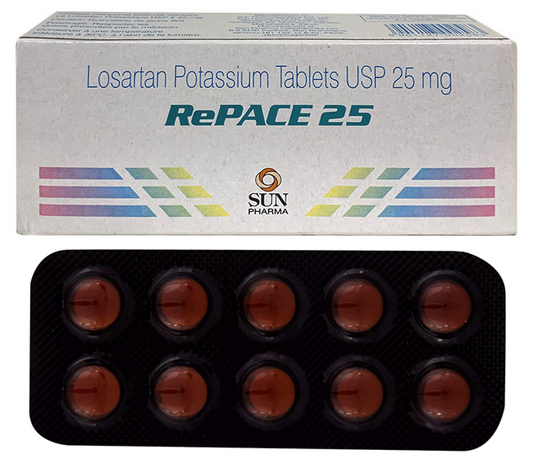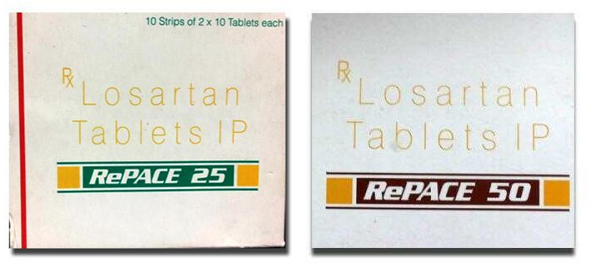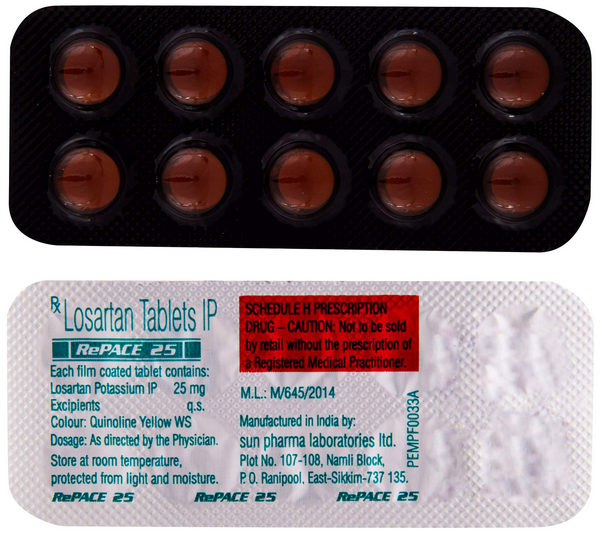
RePace® 25 / 50 / 100 MG Online
- Brand: Generic Cozaar
- Composition: Losartan
- Power: 25mg, 50mg, 100mg
- Pharmacotherapeutic group: Drugs that affect the renin-angiotensin system. Angiotensin II antagonists. Losartan
- Treatment: treatment of essential hypertension in adults / treatment of kidney disease in adult patients with arterial hypertension and type II diabetes mellitus / reducing the risk of stroke in adult patients with arterial hypertension and left ventricular hypertrophy
- Product form: Tablets
- Packaging: Blister
- Manufacturer: Sun Pharmaceutical Industries Ltd.

RePace® 25 / 50 / 100 MG (Losartan) for Sale
RePace® tablets have a positive effect on the work of the heart muscle, its use allows you to reduce the number of deaths due to cardiovascular diseases. By supporting the work of the heart, the drug eliminates the possibility of developing conditions for myocardial infarction, stroke. It activates the protective functions of the kidneys in patients with type 2 diabetes mellitus.
RePace® is a medication whose active substance is losartan, a representative of a class of medications called angiotensin 2 receptor antagonists. These drugs are used to treat patients from 6 years of age to reduce hypertension from mild to moderate (high blood pressure).
Angiotensin 2 is a chemical substance produced by the body that activates the constriction of blood vessels. This relaxation forms the conditions for lowering and normalizing blood pressure. Usually this drug takes from 3 to 6 weeks to achieve a complete result. Losartan can be used alone or in parallel with a diuretic (tablets that increase urine production).
RePace® Losartan has indications for use by adult patients with type 2 diabetes mellitus who have hypertension and proteinuria (the presence of proteins in the urine). Systemic treatment of such a case involves the use of Kozaar to slow the progression of renal diseases due to diabetes.

Indications for use of RePace® 25 / 50 / 100 MG
RePace® is used for the complex therapy of such diseases of the heart muscle as:
- arterial hypertension;
- chronic ischemic heart disease, which is accompanied by symptoms of heart failure;
- in systemic therapy of type 2 diabetes mellitus to reduce the rate of liver disease and reduce the number of protein in the urine.
Using RePace® tablets
RePace® tablets are taken orally, washed down with water, regardless of food intake.
Arterial hypertension
The usual initial and maintenance dose for most patients is 50 mg once a day. The maximum antihypertensive effect is achieved 3 to 6 weeks after the start of treatment. In some patients, increasing the dose of the drug to 100 mg per day (in the morning) may be more effective.
RePace® can be used in combination with other antihypertensive drugs, especially with diuretics (for example, hydrochlorothiazide).
Patients with hypertension and type II diabetes mellitus (proteinuria ≥0.5 g/day)
The usual initial dose is 50 mg once a day. The dose can be increased to 100 mg once a day, depending on blood pressure indicators one month after the start of treatment. RePace® can be used with other antihypertensive drugs (for example, diuretics, calcium channel blockers, alpha- or beta-receptor blockers, central-acting drugs), as well as with insulin and other widely used hypoglycemic drugs (for example, sulfonylureas, glitazones and glucosidase inhibitors).
Reducing the risk of stroke in patients with arterial hypertension and left ventricular hypertrophy, confirmed by ECG
The usual initial dose is 50 mg of RePace® once a day. Depending on the decrease in blood pressure, a low dose of hydrochlorothiazide should be added to the treatment and/or the dose of RePace® should be increased to 100 mg once a day.
Individual groups of patients
Use in patients with impaired renal function and in patients undergoing hemodialysis
There is no need to adjust the initial dose for patients with impaired renal function, as well as for patients undergoing hemodialysis.
Use in patients with impaired liver function
For patients with a history of impaired liver function, a lower dose of the drug should be considered. There is no experience in treating patients with severe hepatic impairment, therefore RePace® is contraindicated in this group of patients.
Use in elderly patients
As a rule, there is no need to adjust the initial dose for elderly patients, not older than 75 years.
How to use RePace® tablets? Dosage
RePace® is consumed regardless of the nutrition schedule, it is only important to adhere to the chosen way of taking pills every day. The instruction recommends swallowing pills without chewing them together with drinking water.
Depending on the patient’s condition, the necessary portion of medication per day is selected. The initial stage involves the use of a dose of 50 or 100 mg of RePace® in 24 hours. There are cases of prescribing a lower concentration of the drug at 25 mg per day. Strictly follow the instructions of the instructions for use and do not exceed the dose of 100 mg in 24 hours. The individual amount of medication is determined by the attending physician.
The standard norm for patients from 6 to 16 years old is calculated according to the weight of the child’s bodies.
- 20-49 kg the norm of taking the medicine is 25 mg per day, can be increased to 50 mg for one dose per day.
- 50 kg and more – 50 mg per day, may increase to 100 mg per day.
- There is no need to change the starting dose for patients with renal insufficiency and those on hemodialysis.
If there is a liver malfunction in the patient’s medical history, a significantly lower dose should be taken into account. There is no clinically proven experience of effective and safe use of the drug RePace® in patients with severe renal insufficiency, therefore its administration to this group of patients is contraindicated.
In patients over 75 years of age, an initial dose of 25 mg can be considered, although for these patients, dose adjustment is usually not necessary.
Overdose
There are several factors that can be taken into account when determining the dose needed by a person: weight, health and other medications. If your doctor recommended a dose that differs from those recommended by the instructions, do not change the way you take the drug without consulting him first. It is very important that this drug is taken as directed by the attending physician. If you missed taking the drug, you do not need to use a double portion to compensate for the missed dose.
General information about overdose is limited. It is likely that symptoms of a decrease in blood pressure may appear significantly below the patient’s usual level, bradycardia. When symptoms of overdose appear, symptomatic supportive therapy is performed.
Use during pregnancy
RePace® should not be taken by pregnant women, because the use of the drug can be dangerous for the fetus. If you are planning to get pregnant, discuss with your doctor other medications that you can take to control your high blood pressure. If pregnancy occurs while taking medication, immediately discontinue therapy and seek medical advice.
It is unknown whether losartan gets into the mother’s milk. Given the danger of affecting pediatric patients under 6 years of age, it is necessary to stop breastfeeding for the period of use of the drug.
Compatibility with alcohol
It is strictly forbidden to drink alcohol during the course of treatment, since its use is allowed only at least 24 hours after taking the medicine. Which is impossible, because at this time the patient must take the next dose of the drug.
Interaction with other medications
During clinical trials of the drug, there were no significant interactions with other medications for medical practice. Hydrochlorothiazide, digoxin, warfarin, cimetidine, phenobarbital and ketoconazole were selected for clinical trials.
Contraindications for RePace® tablets:
- hypersensitivity to any of the components of this drug
- severe hepatic insufficiency
- pregnancy and lactation
- children and adolescents under 18 years of age
- combined use with aliskiren in patients with diabetes mellitus
Side effects of RePace®
Often:
- dizziness
- hyperkalemia, increased activity of alanine aminotransferase (ALT)
- anemia
- impaired renal function, renal failure
- hypotension, including orthostatic
- increased levels of blood urea, serum creatinine and serum potassium
- hypoglycemia
Infrequently:
- headache
- drowsiness, sleep disorders
- fluttering, angina pectoris, tachycardia
- symptomatic hypotension, dose-dependent orthostatic effect,
- abdominal pain, persistent constipation, diarrhea, dyspepsia, nausea, vomiting
- asthenia, weakness, swelling/swelling, chest pain
- back pain, muscle spasms
- cough, nasal congestion, pharyngitis, sinus diseases, upper respiratory tract infections
- dyspnea
- rash, urticaria, itching
Rarely:
- paresthesia
- syncope, atrial fibrillation, stroke
- Post-marketing observations
- Is unknown
- thrombocytopenia
- ringing in the ears
- anaphylactic reactions, angioedema involving the larynx and pharynx, causing airway obstruction, and/or swelling of the face, lips, pharynx and/or tongue. Some of these patients had a history of angioedema when taking ACE inhibitors
- vasculitis, including Schenlein-Genoch purpura
- malaise
- impaired liver function
- photosensitivity, erythroderma.
- myalgia, arthralgia, rhabdomyolysis
- erectile dysfunction, impotence
- depression
- hyponatremia
Rarely:
- hepatitis
- Contraindications
Contents
- 1 RePace® 25 / 50 / 100 MG Online
- 2 RePace® 25 / 50 / 100 MG (Losartan) for Sale
- 2.1 Indications for use of RePace® 25 / 50 / 100 MG
- 2.2 Using RePace® tablets
- 2.2.1 Arterial hypertension
- 2.2.2 Patients with hypertension and type II diabetes mellitus (proteinuria ≥0.5 g/day)
- 2.2.3 Reducing the risk of stroke in patients with arterial hypertension and left ventricular hypertrophy, confirmed by ECG
- 2.2.4 Individual groups of patients
- 2.2.5 Use in patients with impaired liver function
- 2.2.6 Use in elderly patients
- 2.3 How to use RePace® tablets? Dosage
- 2.4 Contraindications for RePace® tablets:
- 2.5 Side effects of RePace®


